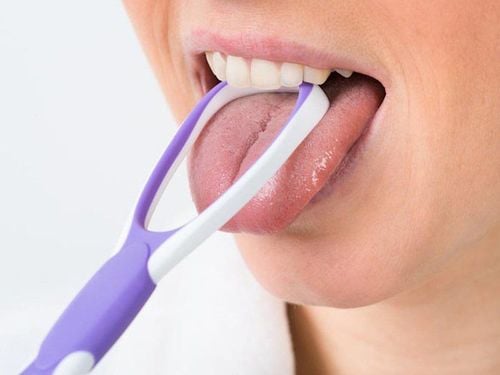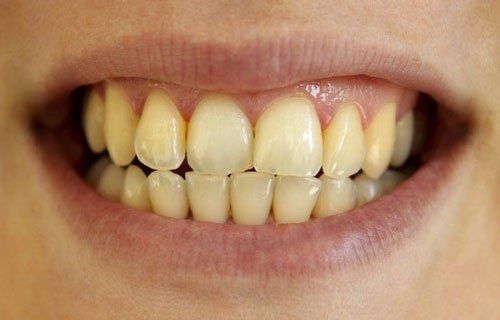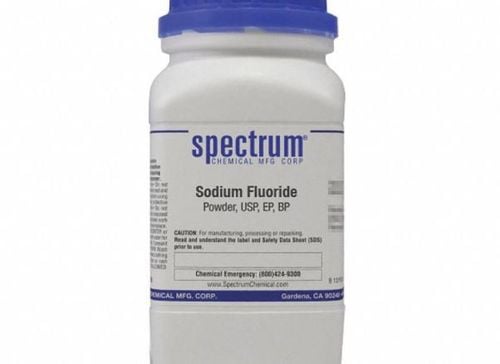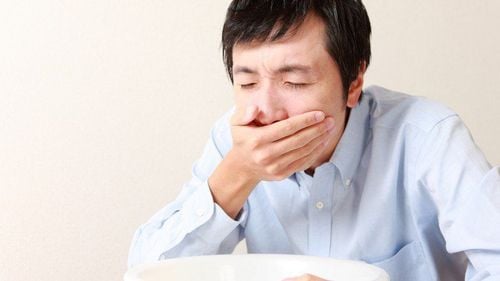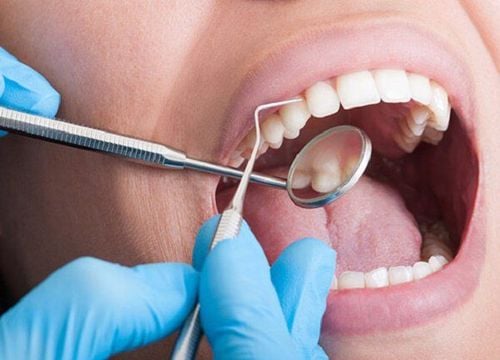This is an automatically translated article.
The article was professionally consulted with Master, Doctor Dang Tien Dat - Doctor of Dental - Jaw - Facial - Department of Medical Examination & Internal Medicine - Vinmec Ha Long International Hospital.According to the American Dental Aid Association, about 10% of players will suffer a tooth or facial injury during any given sports season. Although modern dentistry can treat most trauma to the front teeth, the sequelae will pose many health risks.
1. 3 common types of trauma to the front teeth
1.1. Cracked Teeth When an athlete is hit in the face, it can result in cracked or broken teeth. If a tooth has longitudinal cracks, dental professionals will call it "cracking". These are superficial cracks in the enamel and do not have a major impact on oral health. However, if the crack or split starts at the crown and extends downwards, it is a completely cracked tooth.
With a cracked tooth, you may experience symptoms such as:
Sharp pain when biting; Toothaches come and go but are not always present; Pain when eating and drinking, especially when you consume hot or cold foods; Partial loss of a tooth's outer enamel can expose subsequent layers of the tooth. According to the American Association of Endodontists (AAE), the layer below the enamel is a hard layer called dentin. Next is the soft tissue called the pulp (the location of the teeth's nerves and blood vessels).
You can't always see a cracked tooth with the naked eye, because in many cases there will be no pain. However, it is possible that it will be during your next dental exam that the lesion will be discovered.
If the longitudinal crack does not extend beyond the visible part of the tooth, it will not usually cause partial loss of your tooth and expose the pulp. However, if the crack extends beyond the gum line, it can affect the tip of the tooth, requiring extraction or root canal treatment to avoid infection.
1.2 Fracture If an athlete receives a hit at a certain angle, it can cause a root fracture. Chipped roots are often invisible, you can only detect the problem when there is an infection. The severity of this type of tooth trauma depends on the location of the fracture along the root.
Patients with broken roots receive root canal treatment (also known as endodontic treatment) as soon as possible to prevent infection of the pulp, the less risk of necrosis leading to tooth loss.
1.3. Tooth Recession Sports dental injuries are often associated with teeth falling out. Certain injuries can push teeth into the jawbone. This type of injury is called a dental depression. This condition occurs more commonly in "baby teeth" because the alveolar bone of a child - where the tooth sockets are held - is not as hard as that of an adult. However, it can also happen to athletes of any age. The patient had to take a long break from competition to heal a tooth injury.
Some complications arising from tooth decay include:
The pulp is destroyed or "dead" (necrotic) or damaged irreversibly in a traumatic incident; Damage to the root of the tooth; Root inflammation, the union of the injured tooth root with the alveolar bone.
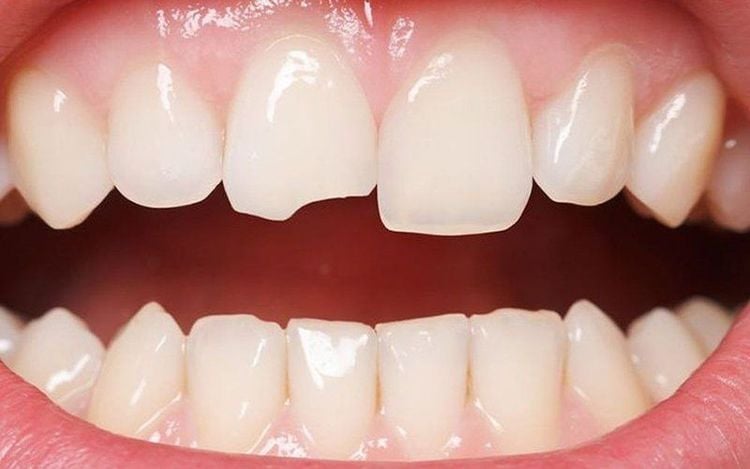
2. How can teeth be protected when playing sports?
Preventing dental trauma (including trauma to the front teeth) will bring many health benefits to you. Did you know that replacing a tooth is about 20 times more expensive than a custom-fitted mouthguard? In fact, the right equipment protects more than 200,000 injuries every year.
2.1. Tooth Protectors for Team Sports There are 2 items to help you protect your teeth well when playing team sports.
Mouthguards:
The National Youth Sports Safety Foundation (NYSSF) estimates that players who don't wear mouth guards are 60 times more likely to have their teeth damaged during play. So a mouth guard is a must when you play any sport that involves balls, clubs or person-to-person contact.
A typical mouth guard covers the top teeth and is great for a sports season. They are designed to protect against cut lips, broken teeth and other types of damage to the mouth.
There are 3 types of mouthguards:
Stock mouthguards: This variety is ready to take out of the pack. While it's not expensive, it can be neither a snug nor comfortable fit. Boil-and-bite mouthguards: This type of protection is exactly what it sounds like. Boil a pre-shaped piece of plastic and then bite into it to fit. You can find bite and boil mouthguards at most sporting goods stores. Custom-made mouthguards: A sports dentist makes these right in the office or in the dental lab. It is specially designed for your mouth by taking impressions of your teeth. From there, the mouth guard is made to better match the impression. Although the above mouthguards are quite expensive, compared with the efforts to find and manufacture these devices, they are very suitable.
Helmet:
1 sturdy helmet with a face guard that gives you an extra layer of protection during sports like football or hockey. Other sports, such as baseball, require special headgear.
Regardless of the sport, if there is an opportunity for body contact with your face or jaw, wear a helmet.
2.2. Dental guards for single-player sports There is little or no risk of you getting hit by a ball, bat or someone else's arm while riding a bike or skateboard. But, you still have to deal with the possibility of self falling and contact with hard ground. You can also hit something like a tree or a parked car, resulting in injury from low visibility on a lane or sidewalk.
Therefore, always wear a helmet to protect your head when biking, skating or skiing. Remember to choose one that is appropriate for the sport for optimal protection. A mouth guard is also a good idea, as wearing a helmet alone won't cover your teeth.
You are less likely to break a tooth while swimming - unless your mouth is hit by a hard wall. If you still want to protect your teeth for long periods of time in the pool, one of the best ways to do this is to make sure the pool you swim in is well maintained. According to Delta Dental, if the pH in your swimming pool is too low (meaning it's too acidic), you're at a higher risk of developing "swimmer's mouth." This condition can cause your teeth to become yellow and painful, as well as increase the formation of tartar (calcium).
Along with maintaining the pool and keeping chlorine levels at recommended levels, you can further protect your teeth by keeping your mouth shut while swimming. That way, the chlorinated water doesn't come into contact with your teeth as often.
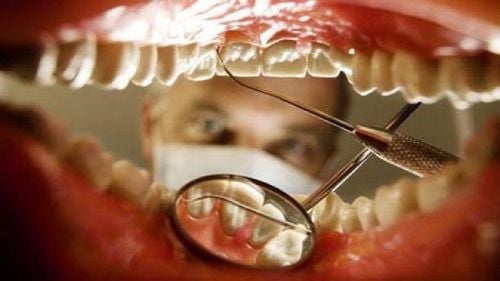
3. What is sports dentistry?
If the injury seriously affects the athlete's oral health, you can consult a sports dentist.
FDI World Dental Federation defines this sub-discipline of dentistry as "the branch of sports medicine for the prevention and treatment of oral injuries and sports-related dental diseases."
For professional athletes, the sports dentist can be their primary dentist.
However, for non-professional athletes, a consultation with your family dentist to ensure you have the proper protection will put you on the winning track to avoid sports injuries. Serious illness may occur.
Maintaining oral health like an athlete is essential. Although today's modern dentistry can repair most tooth injuries experienced during sports, these types of injuries can have the same consequences as any muscle or bone injury that can occur. out. Consult with your dentist when starting to play sports so they can guide you in choosing a mouthguard and recommend any other safeguards they think might help protect against injury. love.
=>> Advice from Master, Doctor Dang Tien Dat - Doctor of Dental - Jaw - Facial - Department of Medical Examination & Internal Medicine - Vinmec Ha Long International Hospital: Dental trauma is a situation that needs to be handled emergency mind. Post-traumatic conditions such as blood loss, risk of infection, tetanus due to dirt need to be treated urgently. Injured teeth (protrusion, subsidence, falling out of the socket...) need to be restored to their old position as soon as possible. In the long run, the ability to recover will decrease.
When you have dental injuries, you can go to Vinmec International General Hospital for examination. Currently, Vinmec is one of the leading prestigious hospitals in the country, trusted by a large number of patients for medical examination and treatment.
Experienced team of doctors, doing gentle, painless procedures. Dedicated nursing care, quick recovery. Patients will be able to use the best medicines, exactly as prescribed by the dentist. The most modern equipment, a clean environment to ensure sterility, will limit complications in the best way.
Please dial HOTLINE for more information or register for an appointment HERE. Download MyVinmec app to make appointments faster and to manage your bookings easily.





